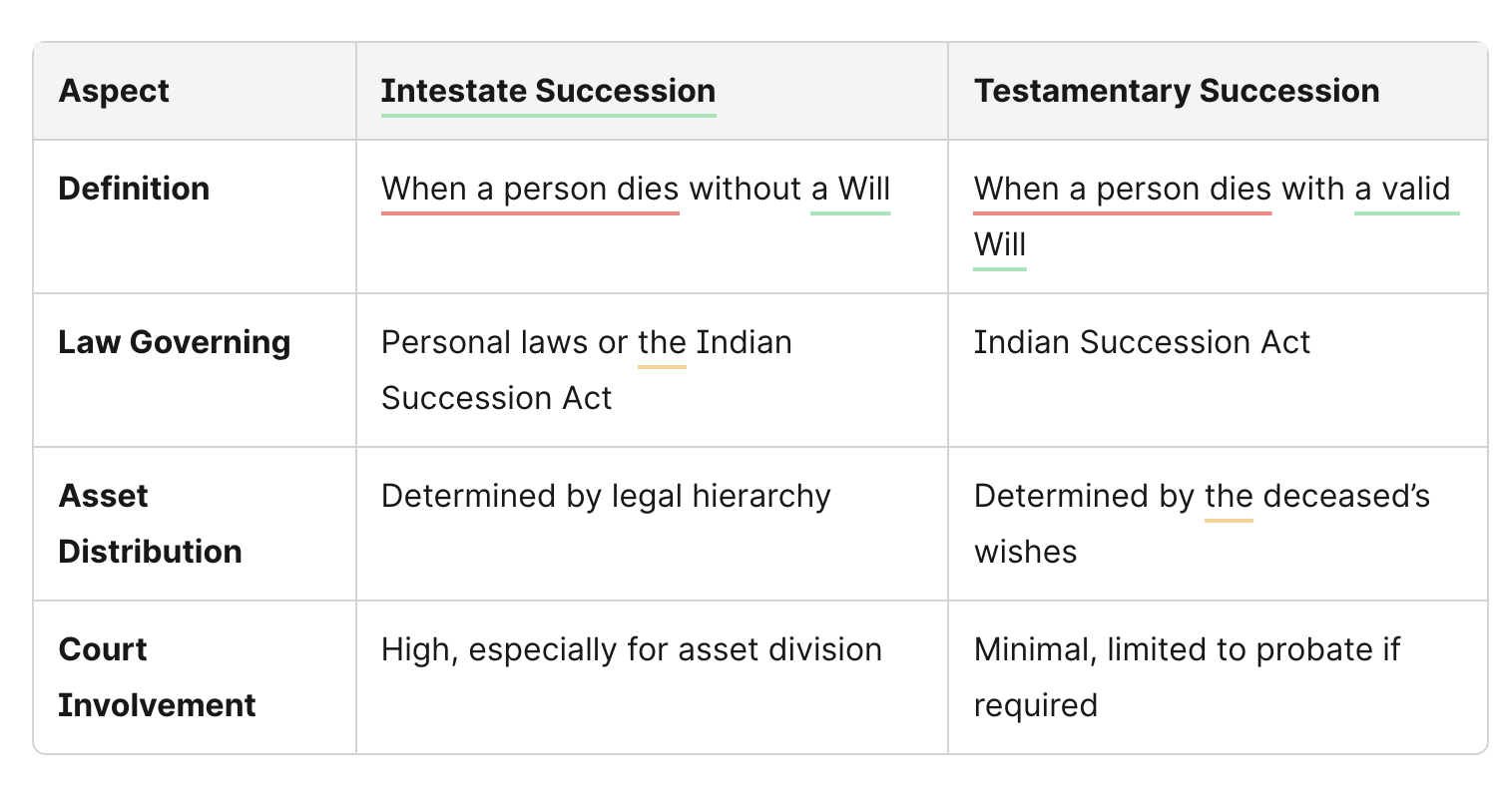Estate planning is a crucial process that ensures your assets and wealth are distributed according to your wishes.
However, not everyone creates a valid Will. When a person dies without a Will, the distribution of their assets falls under intestacy laws.
In India, the rules of intestate succession are governed by the Indian Succession Act, 1925, along with personal laws for Hindus, Muslims, and other communities.
This article explores the concept of intestacy, its implications, and how it affects estate distribution.
What Is Intestacy?
Intestacy refers to the legal situation that arises when a person dies without a valid Will or with a Will that does not dispose of their entire estate.
In such cases, the law determines how the deceased's assets are distributed among their legal heirs.
What Happens When a Person Dies Without a Will?
When a person dies intestate, their estate is distributed according to the succession laws applicable to their religion:
- Hindus, Buddhists, Jains, and Sikhs: Governed by the Hindu Succession Act, 1956.
- Muslims: Governed by Muslim personal law (Sharia).
- Christians, Parsis, and others: Governed by the Indian Succession Act, 1925.
The absence of a valid Will can lead to legal complications, family disputes, and delays in asset distribution.
Intestate Succession Under Hindu Law
Under the Hindu Succession Act, the property of a Hindu male who dies intestate is distributed among his Class I heirs:
- Surviving spouse
- Sons
- Daughters
- Mother
If there are no Class I heirs, the property passes to Class II heirs, which include the deceased’s siblings, grandparents, and others.
For a Hindu female, the property distribution depends on whether it is self-acquired or inherited from her parents or husband’s family.
Intestate Succession Under Muslim Law
Muslim personal laws do not recognise Wills that dispose of more than one-third of the deceased’s property unless approved by heirs.
In intestacy, assets are distributed according to specific shares outlined in the Quran, with separate rules for male and female heirs.
- Male heirs: Sons, father, husband
- Female heirs: Daughters, mother, wife
Intestate Succession Under the Indian Succession Act
For Christians and Parsis, the Indian Succession Act, 1925, provides clear rules for distributing the deceased’s property.
- A surviving spouse receives one-third of the estate, with the remaining two-thirds divided among children.
- If there are no children, the spouse inherits half, and the rest goes to the deceased’s parents or siblings.
Key Implications Of Intestacy
- Delay in Asset Distribution: The absence of a Will often leads to court proceedings, causing delays.
- Family Disputes: Lack of clarity about the deceased’s intentions can lead to disagreements among family members.
- Unintended Beneficiaries: Assets may go to distant relatives or individuals whom the deceased did not intend to benefit.
- Additional Costs: Legal fees and administrative expenses increase due to the involvement of courts.
How Intestacy Affects The Estate

When someone dies without a valid Will, their estate is subject to the following steps:
- Identification of Legal Heirs: A court determines the rightful heirs based on personal laws or the Indian Succession Act.
- Appointment of an Administrator: The court appoints an administrator to manage and distribute the estate.
- Asset Distribution: Assets are divided among the legal heirs according to the succession laws.
Why Should You Avoid Intestacy?
Creating a Will helps you:
- Ensure your assets are distributed according to your wishes.
- Minimise disputes among family members.
- Avoid delays and additional expenses in asset distribution.
- Protect the interests of vulnerable dependents, such as minor children or elderly parents.
Steps To Avoid Intestacy
- Create a Will: Clearly outline your wishes regarding asset distribution.
- Update Your Will: Revise your Will periodically to reflect changes in your life, such as marriage, divorce, or the birth of children.
- Appoint Executors: Designate a trusted individual to carry out the terms of your Will.
- Seek Legal Advice: Consult an estate planning expert to ensure your Will is legally valid.
Common Misconceptions About Intestacy
- “My spouse automatically inherits everything.”
In reality, the property is divided among legal heirs, which may include parents or siblings. - “I don’t need a Will if I have minimal assets.”
Even small estates can cause disputes. A Will ensures clarity and fairness. - “Verbal agreements are sufficient.”
Only a legally valid Will is recognised by the court.
Role Of The Indian Succession Act In Intestacy
The Indian Succession Act, 1925, provides a framework for intestate succession for Christians and Parsis.
It also includes provisions for probate and the role of an Executor in administering the estate.
Key Sections:
- Section 32: Outlines the general principles of succession.
- Section 63: Details the requirements for a valid Will to avoid intestacy.
Intestate Succession vs Testamentary Succession

FAQs About Intestacy
1. What happens if someone dies without a Will in India?
Their assets are distributed according to the applicable succession laws based on their religion.
2. Can an unmarried individual die intestate?
Yes, and their assets are distributed among their legal heirs, such as parents or siblings.
3. How can I avoid intestacy?
Create a legally valid Will and update it regularly to reflect changes in your life.
4. What is the role of the court in intestacy?
The court identifies legal heirs, appoints an administrator, and oversees asset distribution.
The Bottom Line: How Yellow Can Help

Intestacy can lead to uncertainty, delays, and disputes in asset distribution. By creating a valid Will, you can ensure your estate is managed according to your wishes and provide clarity for your family.
With proper planning, you can avoid the pitfalls of intestacy and secure your legacy for future generations.
At Yellow, we can help you with all aspects of estate planning, including Wills, Trusts, Powers of Attorney, Gift Deeds, Legal Heir and Succession Certificates, and Living Wills. We also offer post-demise and asset transfer services. Our team of legal experts has more than 50 years of combined experience.




